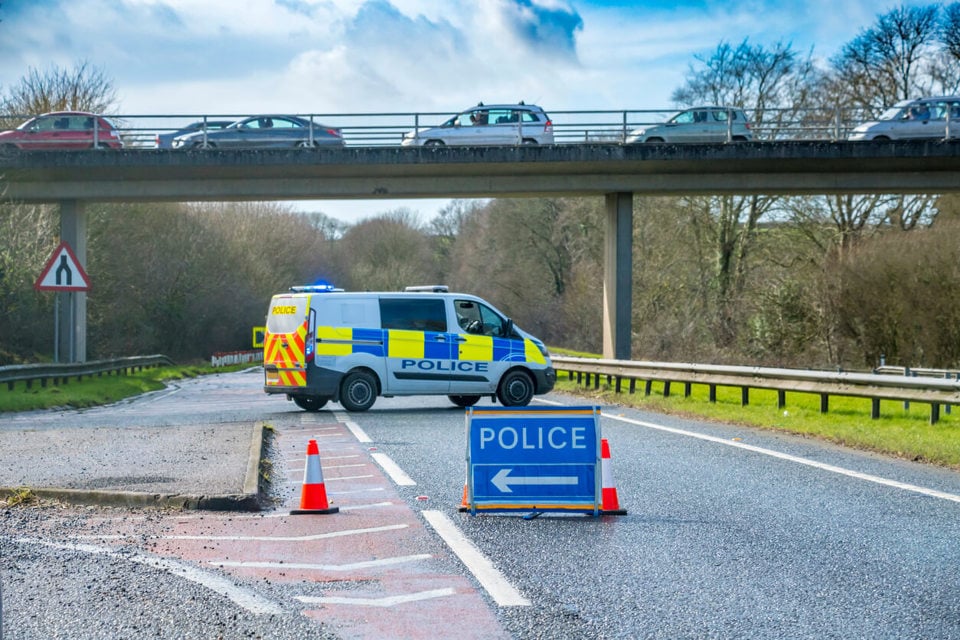With the number of people being killed on UK roads increasing, the Government is being urged by leading road safety charities to adopt targets to help drive down deaths.
Department for Transport (DfT) statistics show that 1,711 people died on the country’s roads in 2022 — an increase of 10% on 2021.
Of those, 303 people died because drivers were travelling above the speed limit — an increase of 20% compared to the year before.
A further 28,031 people suffered serious injuries due to road accidents in 2022 – up 8% on the previous year.
Appearing as a guest speaker on Fleet News at 10 to mark Road Safety Week, Brake’s interim CEO, Ross Moorlock, welcomed the Government adopting a safe systems approach to road safety, but he said: “There are now other things that we need to see from the Government.
“We need a strategic framework for road safety, which has been outstanding now for a long time, and is well overdue.
“We need to see national targets being set so that we can hold people to account, and we know what we are actually striving to achieve and to deliver.
“I think with that, and only with that, can we really then start to make real inroads into the road safety issues as they exist at the moment on our roads.”
Highlighting the dangers of speeding on the Fleet News webinar, Morelock said: “Every day five people die on UK roads and many more suffer serious life-changing injuries and speed is one of the biggest killers.”
He added: “We know that it's a contributory factor in one in four fatal crashes.
“We know that 303 people died in crashes caused by drivers breaking the speed limit in 2022, and that was up 20% on the previous year.
“We know that when we travel at safe speeds, we reduce the risk of road deaths and injuries, and we enable more people to make safe and healthy journeys on foot and by bike.”
This year’s Road Safety Week had speed as its central theme, with fleets supporting the campaign through educating their drivers about the risks.
“We see first-hand the devastating impact of road crashes and injuries through our work supporting road victims,” explained Moorlock.
“We've supported more than 1,500 families in our service already this year and that's why we started this national conversation about speed for Road Safety Week.”
Driving for work is one of the most dangerous things that employers ask their staff to do, with around a third of road deaths and a fifth of serious injuries involve someone driving for work.
Analysis of Government road casualty data, conducted by Brake for Road Safety Week 2023, revealed that road deaths in collisions involving light goods vehicles (LGVs), heavy goods vehicles (HGVs), and buses and coaches all increased between 2021 and 2022.
In 2022, 214 people were killed in crashes involving LGVs, up 10% on 2021 figures, while 220 people were killed in crashes involving HGVs, a 6% increase since 2021.
The data also revealed that 45 people were killed in crashes involving buses or coaches, up 32% since 2021.
Lorna McAtear, head of fleet at National Grid, highlighted how employers can also help mitigate the risk of speeding through having more realistic expectations of what’s achievable in terms of route planning, for example.
She explained: “We haven't adjusted the working practices to reflect that the roads are slower, that we have more traffic and when they get closed, you are stuck for a lot longer now.
“If you remove the pressure on those drivers, they will drive better.”
For Chris Connors, ISS head of fleet and travel for the UK and Ireland, ensuring drivers do not speed is about “information, education, training”.
Telematics ensures the van fleet is monitored, while he acknowledges it can be more difficult for company car drivers. “It’s making sure people realise that speed limits are not targets,” he said.
The Royal Society for the Prevention of Accidents (RoSPA) is also calling for the Government to publish the long-overdue Road Safety Strategic Framework as soon as possible and set casualty reduction targets in line with other G7 countries.
Its call comes as the World Health Organisation released its Global Status Report on Road Safety and analysis by RoSPA shows the UK has made much less progress in the past decade when compared to the decade before - a 5% reduction versus a 46% fall seen across the UK in the decade to 2010.
In Europe, however, there has been a 36% reduction in road deaths during the past decade.
David Walker, head of road and leisure safety at RoSPA, said: “We are seeing around 81 people killed or seriously injured on our roads every day, which is unacceptable and evidently linked to the dramatic lack of UK road safety progress over the last decade.
“We cannot and must not wait to act and urge the Government to publish its long overdue Road Safety Strategic Framework for England, and to set out casualty reduction targets that are in line with other G7 nations.
"Only then can we begin to address our woeful position on the road safety leaderboard.”
Join a panel of fleet experts for the last Fleet News at 10 of 2023, on Friday (December 15) from 10-11am, to discuss and debate the biggest stories from the past month in the fleet sector.
Topics up for debate, include what do we want to see the next Government prioritise, future challenges on the horizon for fleets and an Association of Fleet Professionals (AFP) paper on electric vehicle (EV) service, maintenance and repair (SMR) costs.
Fleet News group editor Stephen Briers will be joined by our panel of fleet professionals: Lorna McAtear, head of fleet, National Grid; Chris Connors, ISS head of fleet & travel (UK and Ireland); Paul Hollick, chair, Association of Fleet Professionals; Duncan Webb, The AA's fleet director; Dale Eynon, director of Defra Group Fleet Services; and Danielle Davison, group fleet director, Herd Group.
To register for the next Fleet News at 10 webinar, click here.























Login to comment
Comments
No comments have been made yet.